Devyser enters Strategic Supply Agreement with Illumina to offer sequencing instruments and products
Devyser today announced that it entered a strategic agreement with Illumina, a global leader in DNA...
Fetal RHD screening NIPT
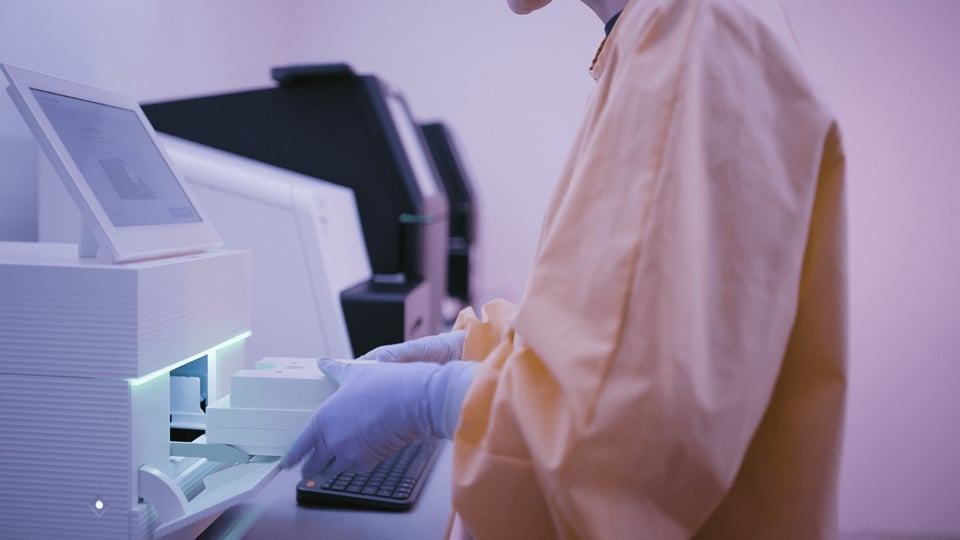
Fetal RHD screening NIPT | October 7, 2022
Non-invasive prenatal testing (NIPT) can help us determine fetal RhD status without a drop of fetal blood. It also revolutionizes the way we do alloimmunization prophylaxis – providing benefits to both patients and hospitals. Here’s what you need to know about it:
In HDFN maternal antibodies pass through the placenta and attack fetal blood cells. The resulting hemolysis can lead to anemia and elevated bilirubin with potential complications including:
Left untreated, HDFN can lead to severe, lifelong consequences or fetal death.
The most common form of HDFN is RhD disease. It occurs when an RhD-negative mother develops anti-RhD antibodies. In a first pregnancy, the woman has not yet developed antibodies. However, once fetal-maternal hemorrhage occurs (usually during childbirth or abortion), the mother's immune system comes into contact with the RhD antigen from fetal blood cells. The resulting IgG memory B cells lead to a rapid immune response at the next exposure.
What happens in the following pregnancy? As soon as the maternal immune system perceives the RhD antigen, it produces IgG against it. These antibodies pass through the placenta and attack RhD-positive red blood cells as they enter the fetal circulation. The attack of the antibodies not only causes hemolytic anemia, but also stresses the liver and spleen, strains the circulatory system, and impairs the fetus' ability to make other proteins. The drop in oncotic pressure causes edema (as severe as hydrops fetalis), while the anemia and portal hypertension contribute to the development of heart failure.
When HDFN was first discovered, we had no way to prevent it. Then, in the 60s, anti-Rho(D) immune globulin prophylaxis was introduced. The treatment prevented at-risk women from developing anti-RhD antibodies in the first place – and it has saved millions of lives ever since. After the introduction of prophylaxis, the risk of maternal alloimmunization dropped from 15% to 0.2-0.4%. [1] However, antibody treatment is not without drawbacks:
Anti-D Ig does prevent hemolytic disease in future pregnancies, but it also comes with potential risks, including severe allergic reactions. What is more, the anti-D Ig comes from human plasma donors – and its supply worldwide is limited.
To reduce overtreatment and manage care, some countries have opted not to routinely administer prophylaxis. Unfortunately, this results in higher HDFN prevalence and lost fetal lives. Is there a better way?
During pregnancy, cell-free fetal DNA can be detected in the mother's blood. This allows us to analyze the baby's genome without invasive, potentially risky procedures such as amniocentesis. When it comes to RhD disease, NIPT can reveal fetal RhD status through a PCR assay of the antigen-encoding gene. With NIPT, clinicians can distinguish between a:
In the latter case, prophylaxis is not required because fetal-maternal hemorrhage does not expose the mother to RhD antigen.
In Germany, all RhD-negative mothers used to receive a course of Rho(D) immune globulin during their first pregnancy. 40% of these women would carry an RhD-negative fetus and thus not need the treatment. With a change in national guidelines allowing prenatal testing, the country is now moving away from unnecessary prophylactic shots, and reimbursement for this test is now in place in Germany
In Sweden, Fetal RHD screening and targeted prophylaxis is routine since several years using commercial CE-IVD tests for RHD screening.
In France, testing is performed at the national level in a centralized manner, whereas in countries such as the UK, Denmark, and the Netherlands, various "home-made" assays are used, which may differ depending on the laboratory performing the testing. “Home-brew” laboratories will soon have to switch to a manufactured assay to meet regulatory requirements based on risk classification. In this regard, there is a sense of urgency to meet IVDR requirements. The RHD assay is classified in the highest risk category, which imposes significant quality and regulatory constraints.
Although anti-D immunoglobulin prophylaxis is an effective way to prevent HDFN, no drug is completely risk-free. So why give it to mothers who may not need it? The benefit of NIPT for fetal RhD status for patients is clear. If a pregnant woman doesn't need the shot, NIPT allows us to safely withhold it.
A 2016 study looked into the cost-effectiveness of the method. They compared targeted prophylaxis to non-targeted and to no prophylaxis. Targeted routine antenatal anti-D prophylaxis (RAADP) had a lower immunisation risk and lower costs than no-RAADP [4].
Given the global shortage of the RhD shot the cost effectiveness of prophylaxis is likely to increase. Using NIPT to determine RhD status will allow physicians to provide better and safer care to their patients – while reducing overuse.
Given the devastating consequences of RhD disease, one question remains: Is the NIPT good enough? Can it tell us exactly when to refuse the shot? Fortunately, the answer is: Yes. NIPT for fetal RhD screening has been shown to be trustworthy. The rate of false-negative and false-positive results is very low in women tested after 11 weeks of gestation. [2] In addition, the process is fully automatable and with single exon kits (like ours) also quick and easy to analyze.
Wikman et al. conducted a study in early pregnancy RHD detection to help develop a robust and accurate assay. They ran the fetal RHD test on RhD-negative women during their first antenatal visit. Fetal DNA was extracted by an automated system. Then, they ran a quantitative PCR assay, based on exon 4 alone. Provided samples were collected after the eighth gestational week, the sensitivity and specificity of this method was close to 99%. [3]
HDFN is a severe, potentially life-threatening condition. With anti-D antibody prophylaxis, we have managed to reduce alloimmunization to under 1% in properly treated mothers. However, the plasma-derived IgG treatment is unnecessary in RhD-negative women carrying an RhD-negative fetus. With NIPT, we can uncover the fetal RhD status and prevent unnecessary exposure to treatment – without the need for invasive fetal blood drawing and with sufficient accuracy to ensure safety.
Want to learn more? Subscribe to our series of in-depth articles on RhD screening here.
In our next article we will answer common questions about fetal RHD screening in routine clinical practice.
[1] Crowther CA, Middleton P. Anti-D administration in pregnancy for preventing rhesus alloimmunization. The Cochrane Library 2009
[2] Yang, H., Llewellyn, A., Walker, R. et al. High-throughput, non-invasive prenatal testing for fetal rhesus D status in RhD-negative women: a systematic review and meta-analysis. BMC Med 17, 37 (2019). https://doi.org/10.1186/s12916-019-1254-4
[3] Wikman AT, Tiblad E, Karlsson A, Olsson ML, Westgren M, Reilly M. Noninvasive single-exon fetal RHD determination in a routine screening program in early pregnancy. Obstet Gynecol. 2012 Aug;120(2 Pt 1):227-34. doi: 10.1097/AOG.0b013e31825d33d9. PMID: 22776962.
[4] Neovius M, Tiblad E, Westgren M, Kublickas M, Neovius K, Wikman A. Cost-effectiveness of first trimester non-invasive fetal RHD screening for targeted antenatal anti-D prophylaxis in RhD-negative pregnant women: a model-based analysis. BJOG. 2016 Jul;123(8):1337-46. doi: 10.1111/1471-0528.13801. Epub 2015 Dec 10. PMID: 26663771.
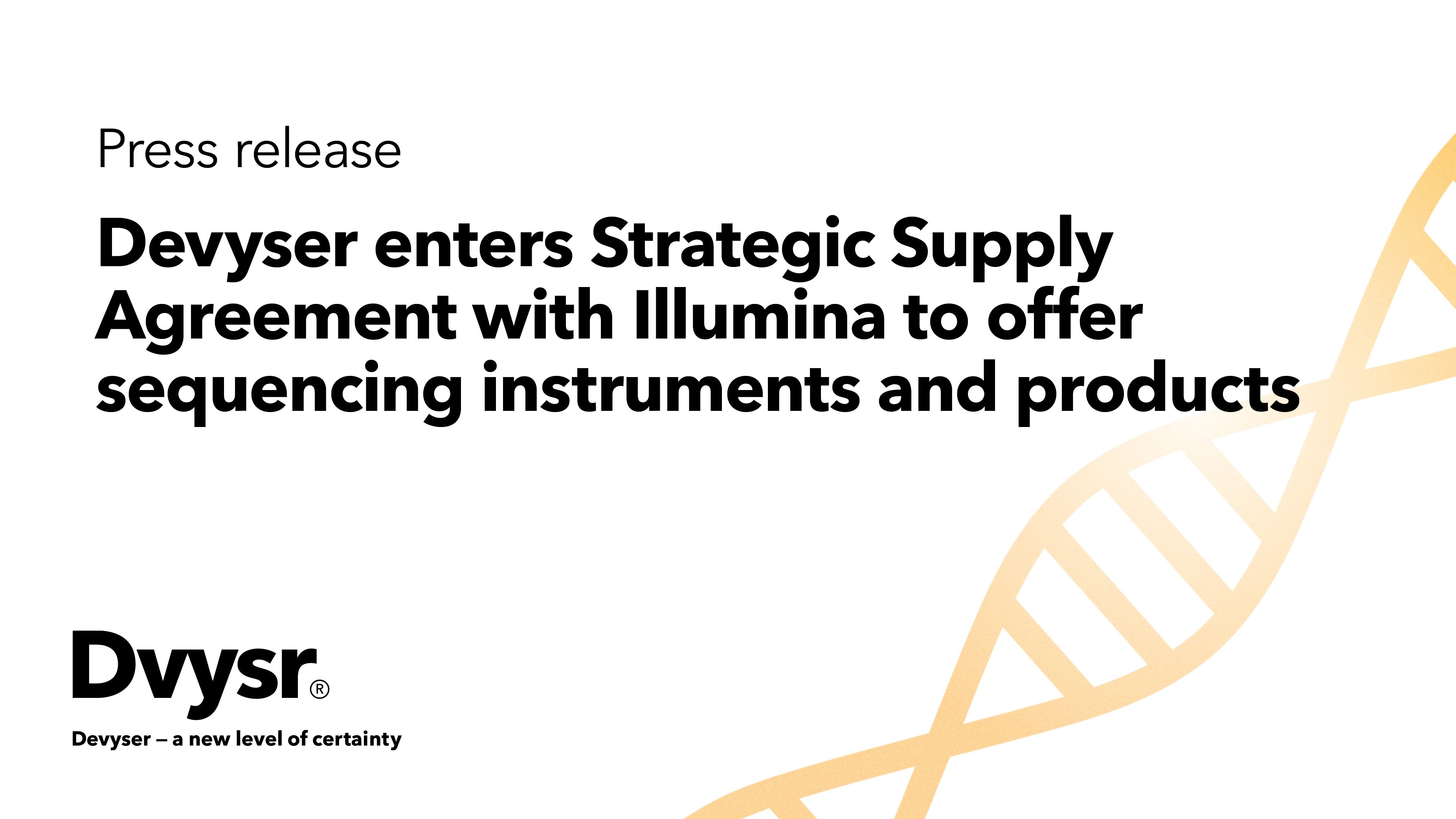
Devyser today announced that it entered a strategic agreement with Illumina, a global leader in DNA...
Read More
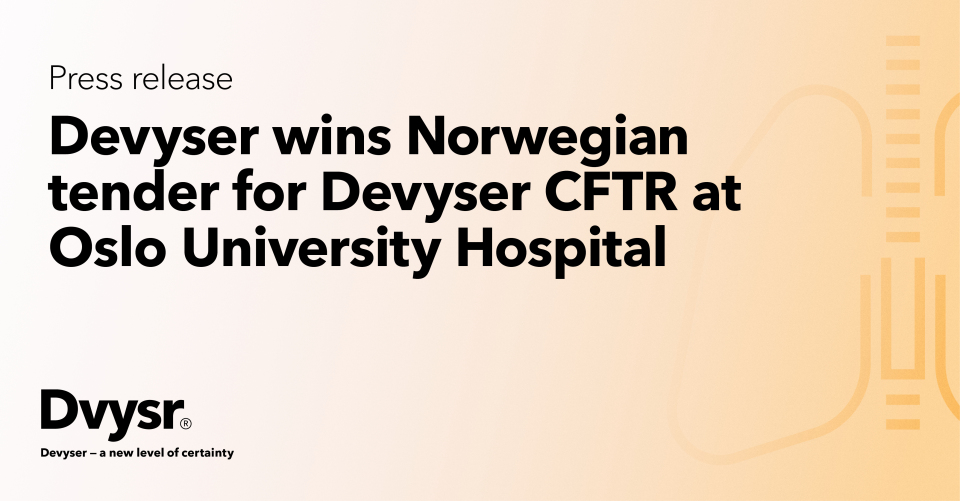
Devyser is proud to announce that the company has been awarded a tender by Oslo University Hospital...
Read More
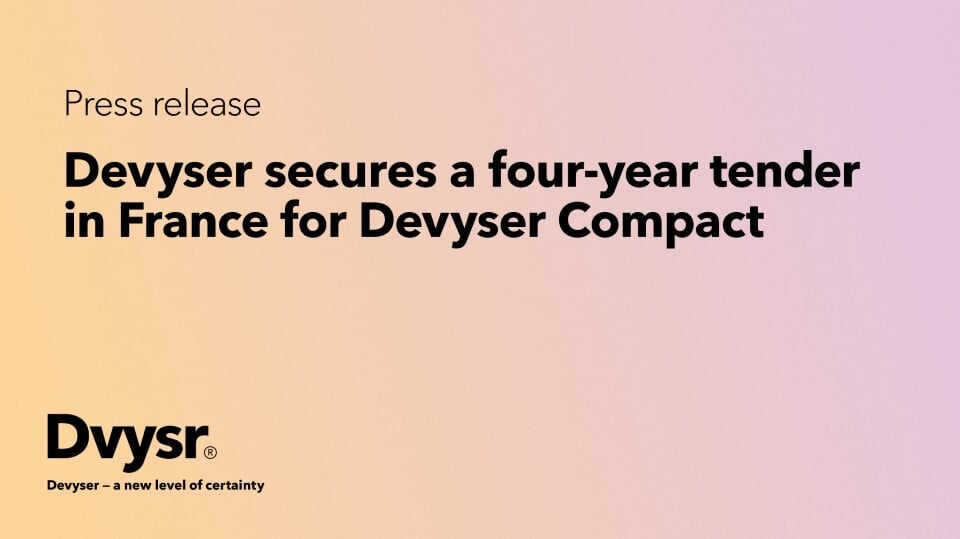
Devyser, a leading provider of advanced genetic testing solutions, has been awarded a new tender in...
Read More
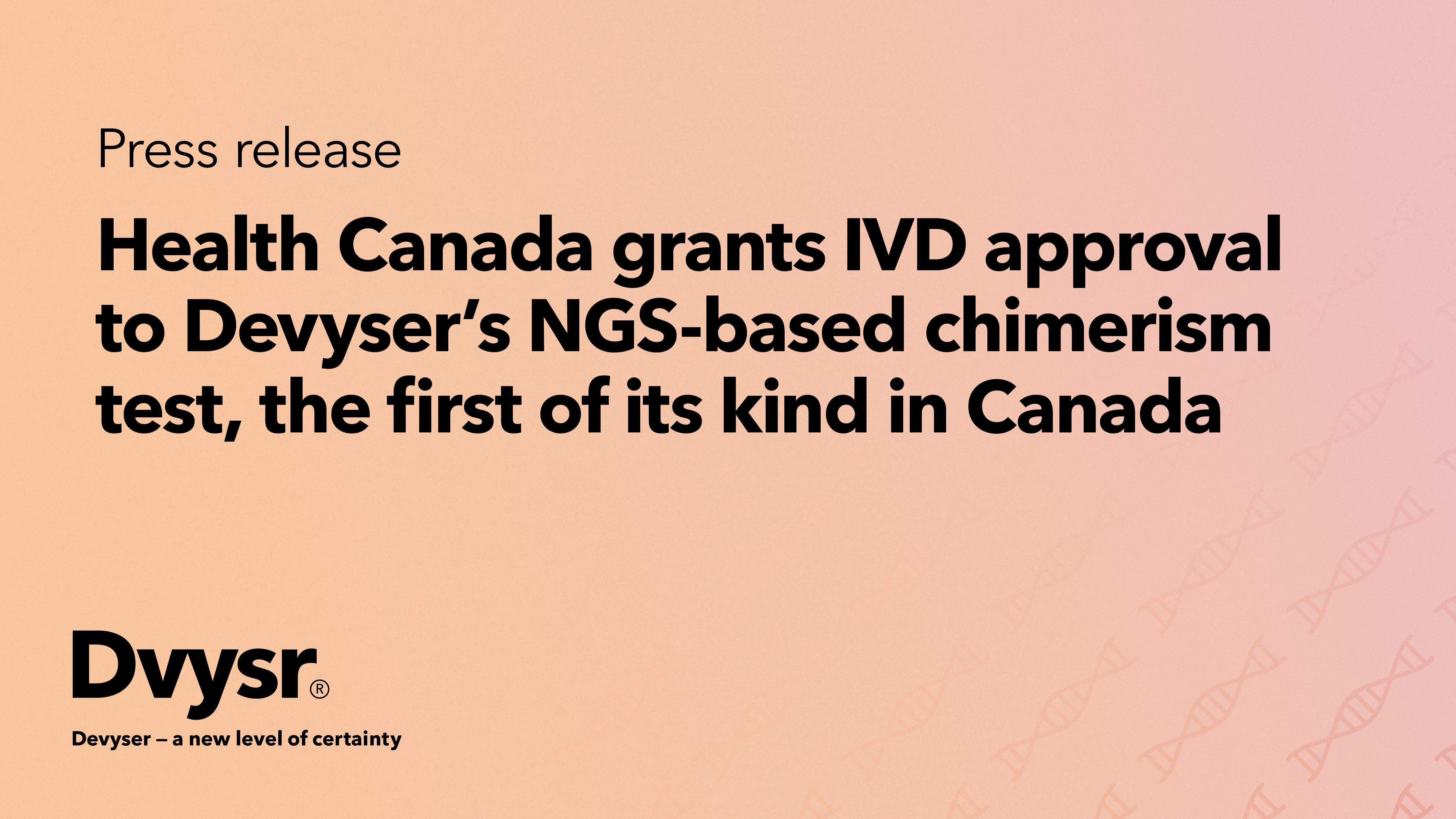
Devyser is proud to announce that One Lambda Devyser Chimerism and Advyser Chimerism have been...
Read More